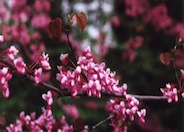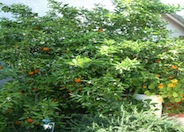
Common name:Chinese Elm
Botanical name:Ulmus parvifolia 'Drake'
The 'Drake' is a tall, semi-evergreen tree with a graceful, weeping habit of growth. Its leaves are small with a dark green color. With proper care, this can mature into a beautiful tree.

Common name:Purple Needle Grass
Botanical name:Nassella pulchra
The Needle Grass is a cool season bunchgrass that grows 1' tall with graceful, shiny purple flower stalks that reach 3' long in the spring. The entire grass turns golden in summer This grass is beautiful in mass plantings, restoration uses or dry slopes. It prefers full sun and can tolerate coastal as well as inland valley areas. It is drought tolerant once it's established and is not fussy about soil. The Needle Grass is California's State Grass and is a beneficial insect plant.

Common name:Giant Wild Rye
Botanical name:Leymus condensatus
This prominent, tall native grass does not make its way into traditional residential landscapes but can be used very effectively in a native or natural garden. It reaches heights of 6'-8' when blooming and will clump to 4'-5' wide. It requires supplemental water to remain green in the summer. Too much water will cause the grass to decline significantly. It can be pruned annually to promote new, more attractive growth. Tall grasses are highly combustible.

Common name:Strawberry Madrone
Botanical name:Arbutus 'Marina'
The 'Marina' has gorgeous bark, with leaves that are smaller and not as glossy as Pacific Madrone. Its flowers are pink, borne in pendant clusters in the summer. The fruit is large, red and quite ornamental. The plant should be grown in sun to part shade, with little or no summer watering when established. The 'Marina' prefers good drainage. -Monterey Bay Nursery

Common name:Little Bluestem
Botanical name:Schizachyrium scoparium 'The Blues'
This grass-like perennial will grow 2'-4' tall and 1'-2' wide. It has wonderful blue leaves that eventually turn a unique reddish color.

Common name:Eastern Redbud
Botanical name:Cercis canadensis
This small, deciduous tree with a rounded head is covered with small flowers of a rose pink color in the spring before the appearance of heart-shaped leaves. It can grow to 25' tall with an equal spread. It has a low branching habit with a rounded form. Leaves turn yellow green in the fall.

Common name:Sweet Orange cultivars
Botanical name:Citrus sinensis
This tree will grow 20'-30' high and 10'-15' wide; it produces sweet, tasty oranges. It has shiny green, leathery foliage and produces clusters of fragrant white flowers that bloom in the spring.

Common name:Endress' Cranesbill
Botanical name:Geranium endressii
This handsome plant has near-evergreen leaves which have a long blooming period.
Dealing With Drought
More than half of the water used at your home is for outside purposes. Studies show that on average, half of the water used outdoors is wasted. The leading cause of waste is incorrectly set and poorly managed irrigation controllers. The second biggest cause of wastage is broken irrigation equipment that goes undetected. There are a few basic things you can do to make a big difference in your water use.
Click in the green box for more information
Dealing With Drought
More than half of the water used at your home is for outside purposes. Studies show that on average, half of the water used outdoors is wasted. The leading cause of waste is incorrectly set and poorly managed irrigation controllers. The second biggest cause of wastage is broken irrigation equipment that goes undetected. There are a few basic things you can do to make a big difference in your water use.
Click in the green box for more information
Dealing With Drought
More than half of the water used at your home is for outside purposes. Studies show that on average, half of the water used outdoors is wasted. The leading cause of waste is incorrectly set and poorly managed irrigation controllers. The second biggest cause of wastage is broken irrigation equipment that goes undetected. There are a few basic things you can do to make a big difference in your water use.
Click in the green box for more information
| Designer: | Tree Next to Driveway |
Photographer: GardenSoft |
Soils and Compost:
Practice grass-cycling by leaving short grass clippings on lawns after mowing, so that nutrients and organic matter are returned to the soil.
Integrated Pest Management:
Drip and other smart irrigation delivers water directly to roots, allowing no excess water for weeds.

